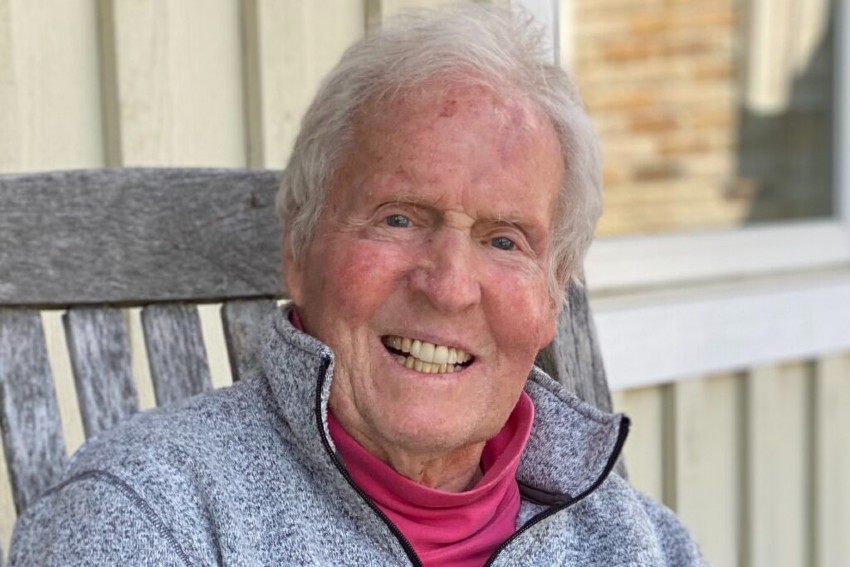
The late Ambassador Frank Shakespeare in retirement near Madison, Wisconsin one year ago. Shakespeare passed away peacefully this morning at his home near Madison at the age of 97
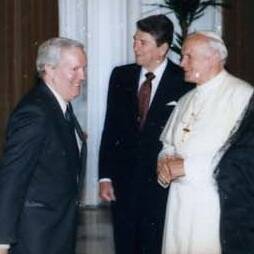
Ambassador Frank Shakespeare in the mid-1980s with US President Ronald Reagan and St. John Paul II in the Vatican. Shakespeare was the 2nd US ambassador to the Vatican, and was critically important to the close relationship between Reagan and Pope John Paul II
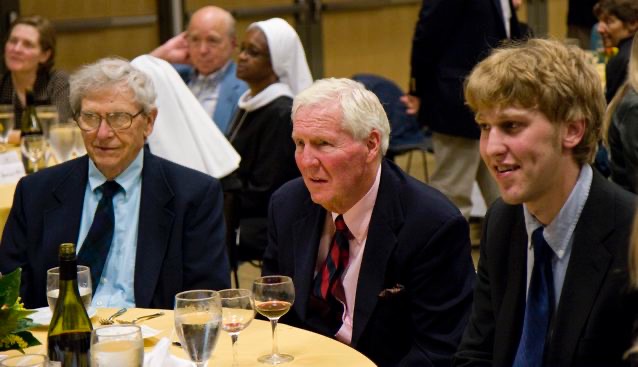
Ambassador Frank Shakespeare (center) with my father, Prof. William Moynihan (left), and Trey Tomlinson (right), at the 15th anniversary dinner of Inside the Vatican magazine in Washington DC in October 2008
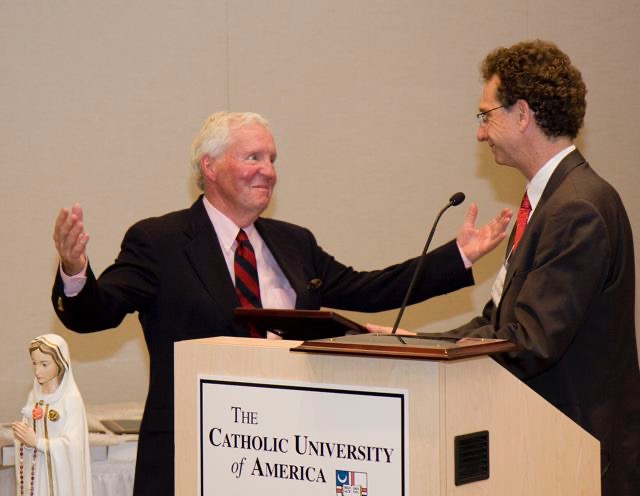
Ambassador Frank Shakespeare as I hand him an award at the 2008 anniversary dinner in Washington D.C. at the Catholic University of America, almost 15 years ago
“I’m absolutely convinced the Pope (John Paul II) said to Reagan, ‘If there’s someone between us, that person can’t be an ambassador unless he knows what I think of Fatima. Send him to Portugal first so he can learn Fatima backwards and forwards.” —Ambassador Frank Shakespeare, in an interview in 2012 (see below). US President Ronald Reagan named Shakespeare the second US ambassador to the Holy See after he had served for several months as ambassador to Portugal, during which time he visited Fatima and met Sister Lucy. He passed away this morning in Madison, Wisconsin, at the name of 97
“Shakespeare brought a rare sense of what ideas, groups, and projects might have a possibility to transcend the moment, and thus potentially transform the era. Shakespeare was wise, and also humble. We should be as willing to continue to learn from him as he was always humbly learning from, and with, others.” —Daniel Schmidt, retired Vice-President of the Bradley Foundation in Milwaukee, Wisconsin, where Shakespeare was for some years the Chairman of the Board, on Shakespeare’s mind and character (link)
Letter #128, 2022, Wednesday, December 14: Farewell, Frank
Feast of St. John of the Cross (1542-1591)
By Robert Moynihan
My good friend, and mentor over many years, Ambassador Frank J. Shakespeare, died peacefully this morning in Madison, Wisconsin, at the age of 97.
May he rest in peace, and may eternal light shine upon him.
***
A Tribute to US Ambassador Frank Shakespeare
I first met Frank in 1987 in Rome during the “Cold War,” when he became the second American ambassador to the Holy See.
I was then a journalist and editor with 30 Days magazine, covering the Vatican.
That “Cold War” period would end four years later, under the reign of Pope John Paul II (1978-2005), in the tumultuous years from 1989 to 1991.
Shakespeare had been involved in 1971, under President Nixon, as head of the USIA (the United States Information Agency) with the departure of Hungarian Cardinal Jozef Mindszenty from the US Embassy in Budapest, where he had found sanctuary after the Communist invasion of Hungary in 1956. Pope Paul VI insisted that Mindszenty leave and come to Rome after 15 years of exile inside the embassy, and Frank was there at the moment of his departure to ensure his safe passage. Franks also carried a letter from Mindszenty to President Nixon, asking Nixon to ensure that the crown and cloak of St. Stephen — 1,000-year-old symbols of Hungarian sovereignty and Christian faith — not fall into the hands of the communists. So Frank evidently played some role in securing those two precious items for the Hungarian people. (A November 12, 1971 report in the Catholic Transcript gives the details of this story at this link.)
Frank then served in the mid-1980s as the US ambassador to Portugal, visiting Fatima, where in 1917 Our Lady appeared to the three shepherd children.
John Paul was already working in close collaboration with US President Ronald Reagan — an effort some observers termed a “Holy Alliance” (the title of an article in Time magazine by Carl Bernstein of Watergate fame on February 24, 1992, link).
Together they supported the Solidarnosc movement in Poland, which sparked the “perestroika” reform movement of Mikhail Gorbachev and eventually led to the dissolution of the Soviet Union on Christmas Day, December 25, 1991.
The collaboration between John Paul and the American president, Reagan, was implemented through the tireless efforts of Frank Shakespeare (US ambassador to the Holy See from the beginning of 1987 to the middle of 1989, link and link).
I interviewed Shakespeare in 1988 for the magazine 30 Days. Shakespeare said to me, “Gorbachev has no chance to salvage the communist system. It will have to be dismantled. Something new will have to emerge.“
That interview marked the beginning of my friendship with the ambassador.
In 1989, I was present in the Vatican when Mikhail Gorbachev accompanied by his wife, Raissa, entered the Cortile San Damaso and walked across the courtyard to go up to Pope John Paul II’s apartment in the Apostolic Palace to meet with him.
For the world, it marked the end of the “Soviet time” and the beginning of the “post-Soviet time.”
For my life, it marked the end of my career as a medievalist and the beginning of an immersion into the struggles and achievements of our modern age.
Ten years later, in December 1999, I traveled with Shakespeare on a three-week trip to Russia.
The centerpiece of the trip was the re-consecration of the Catholic cathedral of Moscow, the Cathedral of the Immaculate Conception of the Holy Virgin Mary (link) which had been taken from the Church by the Soviet government in the 1920s, turned into an office building, and only returned in the 1990s.
On that occasion, I met Metropolitan Hilarion for the first time.
Shakespeare encouraged me to focus my attention on the great issues of faith, or lack of it, in the post-Soviet world (in the East) and in the post-Christian world (in the formerly Christian West).
In December, 2001, we traveled again to Russia, and met with Hilarion and then Metropolitan (now Patriarch) Kirill.
Kirill sat with us in a room in the Patriarchate’s headquarters in Moscow and said (I paraphrase): “To this room, in the fall of 1993, we invited the communists and post-communists to sit around this very table. After many hours of talks, we came to an agreement. In doing so, we avoided a terrible Civil War.”Orthodox Church for the political life of Russia.
And at that moment, I understood the importance of the Orthodox Church for the political life of Russia.
At about the same time, Frank encouraged me to travel again to Russia to investigate the whereabouts of the long-lost icon of Our Lady of Kazan — considered one of the most sacred of Russian icons.
In Kazan, I met Russian scholar Dmitry Khafizov, and learned that the icon was in the safe-keeping of… Pope John Paul II(!).
Eventually the icon returned from Rome, and in Kazan today it is venerated in a shrine built specifically for Russians and pilgrims from around the world.
The Unitas Initiative
And Shakespeare encouraged me to launch our Unitas initiative — to restore in our culture a sense of the transcendent, the holy.
This work is inspired by the thought of, among many others, Pope Benedict XVI (link), Don Luigi Giussani (link), Walker Percy (link), of G.K. Chesterton (link), Rudolph Otto (link), and John Henry Newman (link) — and Frank Shakespeare.
The aim is to keep open access to “that which is above” (link) and so to give to mankind a better hope than that of “transhumanism” (link) and the “Great Reset,” where utility, and not holiness, seems the ideal.
Unitas is working to rekindle that “nostalgia,” that “longing for the return” which leads finally to an encounter with the Person who answers all human longing, at the same time “building bridges” to prepare for the closer unity (unitas) of the Catholic and Orthodox Churches, and in this way moving toward the long-desired goal that the Church breathe with her “two lungs,” East and West, Greek and Latin, Orthodox and Catholic. (link)
This was also part of the vision of Frank Shakespeare, a man of deep faith and tremendous diplomatic skill.
I will miss him very much, and attempt to bring his vision to fruition.
I would be grateful if you would consider joining with us in this work. —RM
***
Frank Shakespeare’s Life
Francis J. Shakespeare (born April 9, 1925) was the president of CBS Television before entering public service as a diplomat.
He served as the United States Ambassador to Portugal from 1985 to 1986 and the United States Ambassador to the Holy See from 1986 to 1989.
Born in New York City to Francis and Frances (née Hughes) Shakespeare and raised in the Catholic faith, Shakespeare graduated (with a B.S.) from the College of the Holy Cross in 1946. He also served in the U.S. Navy from 1945 to 1946.
Shakespeare was president of CBS Television in New York from 1950 to 1969, when he was appointed by President Richard Nixon as director of the United States Information Agency. He returned to the private sector in 1973, and became an executive vice president of Westinghouse in New York. In 1975 he became vice chairman of RKO General.
In 1981 President Ronald Reagan named him chairman of the Board for International Broadcasting, the entity which oversaw the operations of Radio Free Europe. He held this position until 1985, when Reagan appointed him United States Ambassador to Portugal.
The following year, in September 1986, Shakespeare was appointed United States Ambassador to the Holy See.
In 1979, Shakespeare became an honorary member of the board of trustees for The Heritage Foundation, a Washington, D.C.-based public policy research institute. He also currently served as a trustee of the Lynde and Harry Bradley Foundation of Milwaukee, Wisconsin.
***
The 12 American Ambassadors to the Vatican
The Vatican first sent an Ambassador to the Holy See in 1984, under President Ronald Reagan, when John Paul II was Pope. It was in the years when Mikhail Gorbachev began his policy of perestroika and glasnost, and the following is a list of U.S. Ambassadors to the Holy See:
Years served:
William Wilson 1984–1986
Frank Shakespeare 1986–1989
Thomas Patrick Melady 1989–1993
Raymond Flynn 1993–1997
Lindy Boggs 1997–2001
James Nicholson 2001–2005
Francis Rooney 2005–2008
Mary Ann Glendon 2008–2009
Miguel H. Díaz 2009–2012
Mario Mesquita (Chargé d’Affaires)[4][5]2012–2013
Ken Hackett 2013–2017
Callista Gingrich 2017–2021
Patrick Connell (Chargé d’Affaires) 2021–2022
Joe Donnelly 2022–present
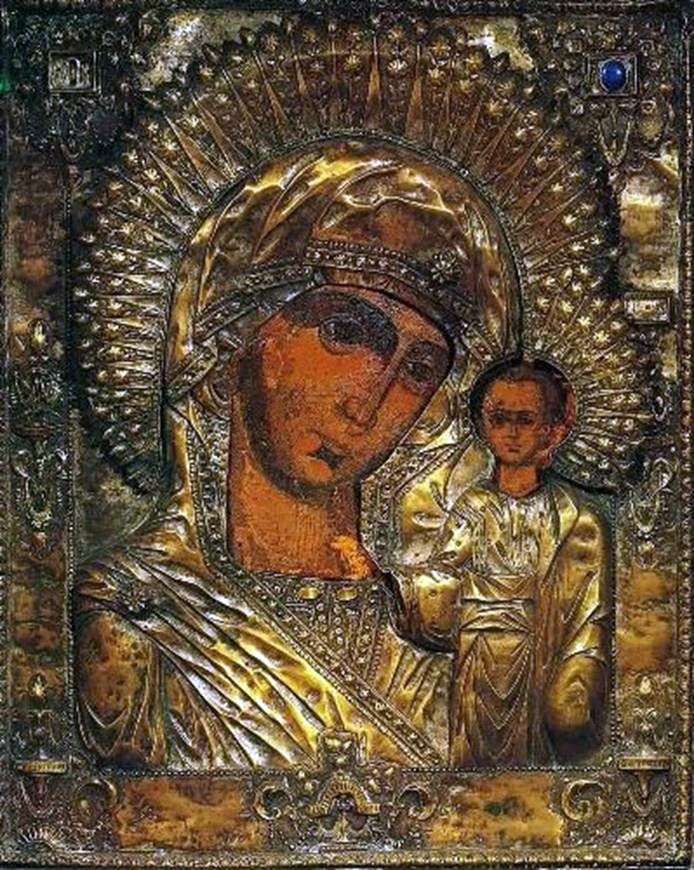
The icon of Our Lady of Kazan. The icon was lost in 1918, and returned to Russia in 2004 by John Paul II. Frank Shakespeare encouraged the effort to return the icon to Russia
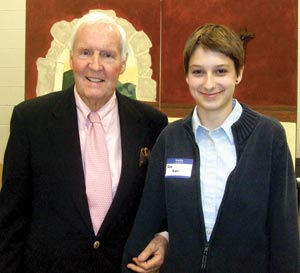
Ambassador Frank Shakespeare meets Zoe Apel, a senior at St. Ambrose Academy in Madison, Wisconsin, in 2012, 10 years ago.
The former U.S. ambassador to the Vatican gave an interview on that occasion about his experiences serving in the Reagan administration.
(Catholic Herald photo/Mary C. Uhler)
The following is the text of a Catholic Herald story published 10 years ago, on March 22, 2012:
Shakespeare recalls experiences as U.S. ambassador to Vatican (link)
March 22, 2012
By Mary C. Uhler, Catholic Herald Staff
MADISON, WISCONSIN — Ambassador Frank Shakespeare called it an “extraordinary time” following a “huge transition in human civilization.” And he was right in the thick of it all.
In a recent talk at St. Ambrose Academy in Madison, the first U.S. ambassador to the Holy See (from 1986 to 1989) talked about his experiences serving with President Ronald Reagan and Pope John Paul II.
Shakespeare currently lives in Deerfield and is a member of St. Patrick Parish in Cottage Grove.
In some never-revealed stories, Shakespeare talked about U.S. and Vatican relations with the Soviet Union and what he sees as the influence of the revelations of Our Lady at Fatima in world events.
Communications revolution
Shakespeare’s own career began after his military service in World War II. He started at CBS Radio in New York City and then began working for the new CBS Television, moving up the ranks to the top position as president.
He noted that this was a “huge transition time” in the world. After World War II ended, there was a “communications revolution.”
He said “television changed everything.” By 1960, every living room in the U.S. had a TV. “All of these things I’m telling you took place during a new era of communications unique in history,” he said.
Changes in the papacy
Some of the unique events included changes in the papacy. In 1978, Pope Paul VI died after 16 years as pontiff. Cardinals under the age of 80 went to Rome to elect a new pope. “Every pope for 436 years had been an Italian cardinal,” noted Shakespeare.
This time was no different. “They were men of tradition,” he said. “They took an Italian cardinal and elected him pope.” He took the name of John Paul I, after his two predecessors.
However, 33 days later, Pope John Paul I died. The cardinals went back to Rome to elect a new pope. “They now knew each other. It was an utterly different meeting,” observed Shakespeare. “They decided to break with tradition.”
The world was still recovering from World War II. “Europe had torn itself apart, a German madman had killed six million Jews, the United States was emerging as the greatest temporal power, and the Soviet Union meant to take over the world,” he said.
In 1978, the cardinals thought that Poland was a pivotal country in Europe. “They knew there was a man in Poland, one of the most extraordinary linguists in the world. He spoke nine languages fluently. He was a very strong man,” said Shakespeare.
The cardinals stunned the world by electing Cardinal Karol Wojtyla of Poland as the next pope. He took the name Pope John Paul II.
A new president
In 1980, the United States held a presidential election. The people elected Ronald Reagan as president, “a grade B movie actor from California,” said Shakespeare.
“A new Peter, the first non-Italian in almost 500 years, and the U.S. president is Ronald Reagan. It’s very unusual,” observed Shakespeare, saying “obviously the man upstairs (God) was involved.”
He noted that both Reagan and the pope were shot in 1981 in separate instances. “Both men survived bullets an eighth of an inch from their hearts. It started a period of 13 years that changed the world.”
President Reagan “knew that his job was to prevent Russia from taking over western Europe,” said Shakespeare. The president also realized that he needed to get acquainted with John Paul II, who knew about the Soviet Union.
Ambassador to Portugal
After serving in the Nixon administration for four years as an “ambassador at large,” Shakespeare was asked to be U.S. ambassador to Portugal by President Reagan in 1985. He agreed and went to Portugal, where he was contacted by the papal nuncio who said, “I want to take you to Fatima to meet Lucy.”
Fortunately Shakespeare had studied the appearance of Mary in 1917 to the three children at Fatima, Lucy being one of them. Mary had told the children that Russia would make an effort to dominate the world, and that’s what was happening in 1985.
“John Paul II had gone to Portugal and he met with Lucy,” Shakespeare said. “He deeply believed in Fatima and he believed that Russia would try to take over the world. What the children said about Russia had happened. The only thing standing in the way was the United States.”
Ambassador to Holy See
After he spent five months in Portugal, Shakespeare received a call from President Reagan asking if he would be the first U.S. ambassador to the Vatican.
Shakespeare thinks that both the president and the Holy Father wanted the ambassador to understand Mary’s message to the children at Fatima.
President Reagan implied that he and the pope will have “to be locked together” in their efforts to deal with the Soviet Union.
The president and the pope
When President Reagan was attending a meeting of the Group of Eight in northern Italy, he decided to meet with Pope John Paul II.
Shakespeare met with President Reagan before the meeting. “We talked for about 45 minutes. We flew to the Vatican Gardens by helicopter and went to the pope’s private office. They were alone for about an hour and a half.”
After the meeting, President Reagan briefed Shakespeare. “Reagan very clearly told me everything they talked about. He talked in greatest detail and candor.”
Shakespeare said, “I’m absolutely convinced the pope said to Reagan, ‘If there’s someone between us, that person can’t be an ambassador unless he knows what I think of Fatima. Send him to Portugal first so he can learn Fatima backwards and forwards.’ The papal nuncio went out of his way to ‘Fatimize’ me.”
Shakespeare served as the Vatican ambassador for three years, the last years of Reagan’s administration. He said that Reagan and the pope “shared everything.”
Collapse of Soviet Union
The Union of Soviet Socialist Republics (USSR) was dissolved on December 25, 1991. This left all 15 republics of the Soviet Union as independent sovereign states. It marked an end to the Cold War.
In Mary, we find many answers to our confusion, our malaise, our doubt, our sinfulness, our estrangement, from God and from ourselves… if we would but look to her!
And therefore…
Inside the Vatican presents a stunning new, 100-page special edition, MARY: Behold Your Mother, just now at the press, and available NOW.






Facebook Comments